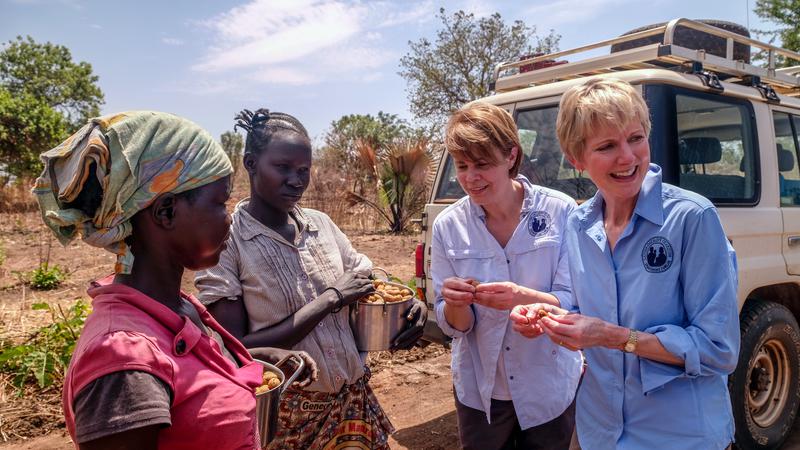“It was heartwarming to see the faces of the refugees change from weary to relieved as they received immediate services,” said Sister Jean B. Bingham, a leader of one of the largest children’s organizations in the world.
Sister Bingham, first counselor in the Primary general presidency* of The Church of Jesus Christ of Latter-day Saints, recently returned from a UNICEF field visit to Uganda with Sharon Eubank, director of the Church’s Humanitarian Services and LDS Charities, where they got a firsthand look at what is happening as refugees cross the border and receive assistance by relief agencies at camps.
The Church leaders, alongside UNICEF, visited with people in the Bidi Bidi refugee resettlement center of more than 250,000 people, as well as schools and surrounding communities. The camp opened last August and is one of the largest refugee settlements in the world.
The workers try to keep families together and provide immediate needs such as shelter, food and medical care. In many instances, the refugees arrive with nothing but the clothes they are wearing and what they can physically carry.
Tabu Florence William, 27, from South Sudan and her children were robbed by rebels at gunpoint as they traveled to the camp. “What make[s] me to feel happy [is here there is] no other fighting, no killings,” she said.
“The schools we visited were remarkable,” she continued. “There was only one teacher for every 100 students and yet they kept the children engaged and did their very best to teach them the skills needed to move forward.”
The trip had a lasting impact on the Church leaders, one they will never forget.
| Temple Square is always beautiful in the springtime. Gardeners work to prepare the ground for General Conference. 2012 Intellectual Reserve, Inc. All rights reserved. | 1 / 0 |
“One of the people that I am never going to forget was [as] the buses pulled up at the reception center, … a mother was the first one out of the bus, and she was carrying a little baby, and she had three little kids clinging onto her skirt. And you could just see as she walked up toward the registration tent, the relief washing over her,” shared Eubank.
UNICEF is working with other relief agencies on the front lines in Uganda. The Church has worked with or supported UNICEF, the United Nations Children’s Fund, for more than 20 years, and in recent years has partnered with UNICEF USA to reach children with immunizations, education and to meet other needs around the world.
“One of the most important pieces of the partnership is UNICEF goes to places where LDS Charities will never be able to go,” explained Eubank. UNICEF provides relief in more than 190 countries and territories.
“Ultimately, we both arrived at the fact that immunizations and education for refugees and displaced persons are some of the most impactful changes that we can make in the lives of children and families,” said Leslie Goldman, vice president of Global Cause Partnerships for UNICEF USA.
“The partnership that we’re building has huge opportunities to really change the circumstances for so many families, both in Uganda and around the world,” said Goldman.
The camps in Uganda are receiving refugees who are escaping from neighboring countries experiencing civil war and famine.
“Uganda is on the boundary of several refugee situations of conflict where you’ve got people fleeing their homes,” said Robert Hokanson, manager of the refugee initiative for LDS Charities. “You’ve got people from South Sudan [and] DR Congo that are fleeing to Uganda. It’s a unique place where you’ve got people fleeing from different situations.”
Unlike in many other countries, Hokanson said refugees in Uganda can freely move around the country. “They give them the right to work — to start a business, to seek out a living. They also go out of their way to help refugee children integrate into local schools.”
Hokanson said LDS Charities has a growing relationship with UNICEF USA. “We’re looking at how to strengthen and deepen that relationship moving forward,” he concluded.
“We met some marvelous people,” said Sister Bingham. “Many of the aid workers had been refugees themselves and were reaching out to lift and help the newcomers.”
Sister Bingham said, “I've seen how this partnership really helps families. And this support system helps these mothers take care of their children, helps keep these families together, helps keep their children alive.”
